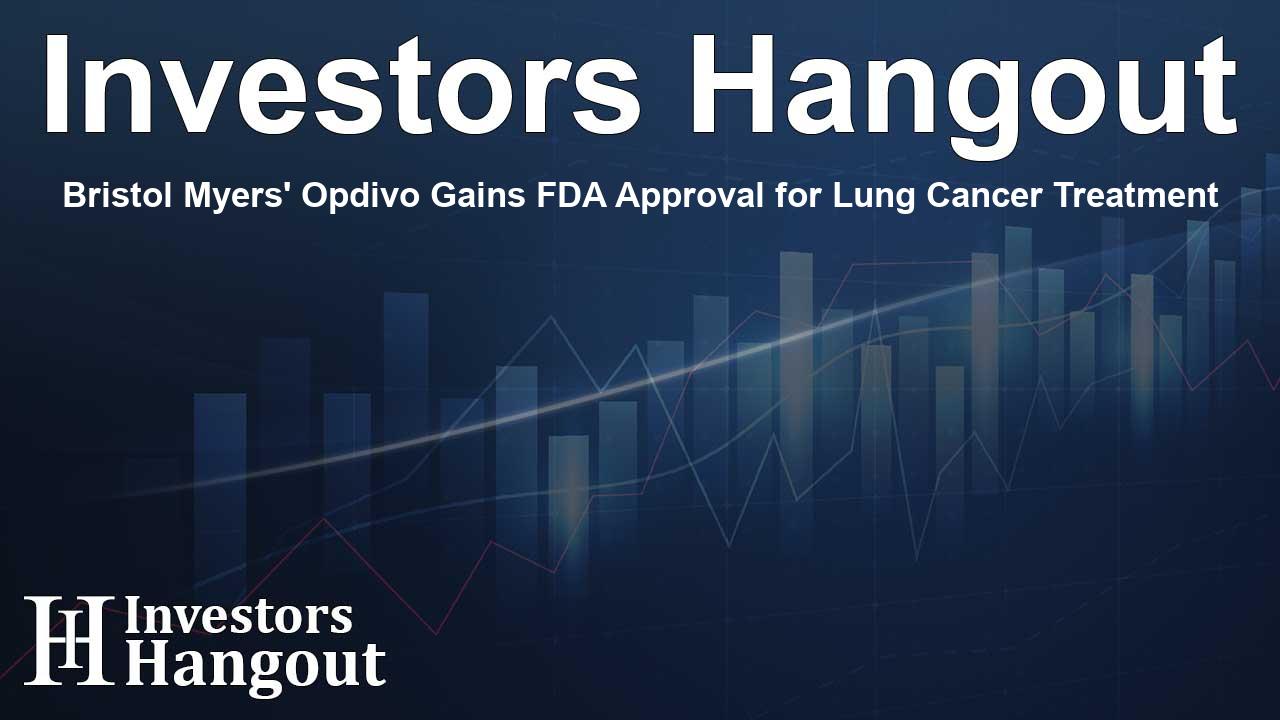Bristol Myers' Opdivo Gains FDA Approval for Lung Cancer Treatment

FDA Approval Positions Opdivo as a Leading Treatment Option
Recently, the FDA granted Bristol Myers Squibb & Co’s Opdivo (nivolumab) expanded approval for resectable non-small cell lung cancer (NSCLC). This approval signifies a crucial advancement in treatment options available to patients who do not possess known epidermal growth factor receptor (EGFR) mutations or anaplastic lymphoma kinase (ALK) rearrangements.
Combination Therapy Enhances Patient Outcomes
This approval allows Opdivo to be utilized alongside platinum-doublet chemotherapy as a neoadjuvant treatment followed by single-agent Opdivo as adjuvant therapy after surgery. The success of this regimen is founded on the findings from the CheckMate-77T trial, which highlighted the effectiveness of immunotherapy combinations in patients with resectable NSCLC.
Significant Reduction in Disease Recurrence
The research presents compelling data: patients treated with Opdivo showed a 42% reduction in the risk of disease recurrence, progression, or death compared to those receiving chemotherapy alone, with a median follow-up period of 25.4 months. This notable improvement showcases Opdivo's capabilities in enhancing survival rates for lung cancer patients.
Event-Free Survival Rates Demonstrate Efficacy
Further supporting Opdivo's efficacy, the trial indicated that 70% of patients in the Opdivo group experienced 18-month event-free survival (EFS). In contrast, only 50% of the chemotherapy and placebo group achieved similar results. This discrepancy further emphasizes how Opdivo is paving the way for better treatment outcomes.
Impact on Pathologic Response Rates
Another convincing statistic is that a significant 25% of patients receiving Opdivo achieved a pathologic response (pCR), compared to just 4.7% in the alternative treatment arm. These findings suggest a robust performance for Opdivo in the treatment landscape of NSCLC.
Strategic Moves Amid Patent Expiration Risks
As Bristol Myers navigates the challenges associated with the impending patent cliff of its leading medications, including Eliquis (apixaban) and Opdivo, the company is actively seeking to broaden its portfolio. Recently, they also gained FDA approval for Cobenfy (xanomeline and trospium chloride, KarXT), aimed at treating schizophrenia in adults, which reflects an impressive diversification strategy.
According to the latest filings, the patent of Eliquis is due to expire in 2026. Meanwhile, Opdivo’s patent loss is projected for 2028 in the U.S., 2030 in Europe, and 2031 in Japan. Another cancer treatment, Yervoy (ipilimumab), is on track to lose market exclusivity by 2025 in both the U.S. and Japan, followed by 2026 in Europe.
Current Market Performance of BMY Stock
In the backdrop of these developments, Bristol Myers' stock (BMY) exhibited a 1.07% downturn, reaching $53.62 in premarket trading as of the latest reports. Such fluctuations prompt investors to remain vigilant regarding the company's performance.
Frequently Asked Questions
What is Opdivo approved for?
Opdivo is approved for treating resectable non-small cell lung cancer (NSCLC) in a combination regimen with chemotherapy and as a follow-up single-agent therapy.
What were the results of the CheckMate-77T trial?
The trial demonstrated that patients receiving Opdivo had a 42% reduced risk of disease recurrence and an 18-month event-free survival rate of 70% compared to 50% in the comparator group.
How does Opdivo compare to traditional chemotherapy?
Opdivo provided statistically significant benefits over traditional chemotherapy, showcasing its ability to enhance patient outcomes in lung cancer treatment.
What challenges is Bristol Myers facing with patent expirations?
Bristol Myers is preparing for the loss of exclusivity for several key drugs, including Eliquis and Opdivo, which may impact revenue.
What recent developments has Bristol Myers made besides Opdivo?
In addition to Opdivo, Bristol Myers has gained FDA approval for Cobenfy, a medication designed to treat schizophrenia in adults, showcasing its efforts to diversify its drug portfolio.
About Investors Hangout
Investors Hangout is a leading online stock forum for financial discussion and learning, offering a wide range of free tools and resources. It draws in traders of all levels, who exchange market knowledge, investigate trading tactics, and keep an eye on industry developments in real time. Featuring financial articles, stock message boards, quotes, charts, company profiles, and live news updates. Through cooperative learning and a wealth of informational resources, it helps users from novices creating their first portfolios to experts honing their techniques. Join Investors Hangout today: https://investorshangout.com/
Disclaimer: The content of this article is solely for general informational purposes only; it does not represent legal, financial, or investment advice. Investors Hangout does not offer financial advice; the author is not a licensed financial advisor. Consult a qualified advisor before making any financial or investment decisions based on this article. The author's interpretation of publicly available data shapes the opinions presented here; as a result, they should not be taken as advice to purchase, sell, or hold any securities mentioned or any other investments. The author does not guarantee the accuracy, completeness, or timeliness of any material, providing it "as is." Information and market conditions may change; past performance is not indicative of future outcomes. If any of the material offered here is inaccurate, please contact us for corrections.